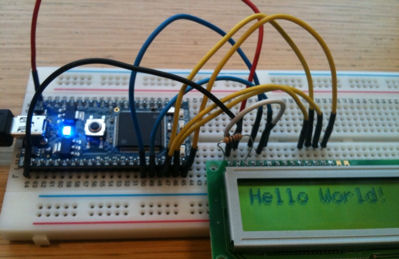You are viewing an older revision! See the latest version
Text LCD
A driver for Text LCD panels using the 4-bit HD4478 driver.

Hello World!¶
Wiring:
GND -- 0v VCC -- 3.3v VO --[ 1k resistor ]-- 0v RS -- p15 RW -- 0v E -- p16 D0 -- D1 -- D2 -- D3 -- D4 -- p17 D5 -- p18 D6 -- p19 D7 -- p20
Text LCD Library¶
Import library
Public Types |
|
| enum | LCDType { LCD16x2 , LCD16x2B , LCD20x2 , LCD20x4 } |
|
LCD panel format. More... |
|
Public Member Functions |
|
| TextLCD (PinName rs, PinName e, PinName d4, PinName d5, PinName d6, PinName d7, LCDType type=LCD16x2) | |
|
Create a
TextLCD
interface.
|
|
| int | putc (int c) |
|
Write a character to the LCD.
|
|
| int | printf (const char *format,...) |
|
Write a formated string to the LCD.
|
|
| void | locate (int column, int row) |
|
Locate to a screen column and row.
|
|
| void | cls () |
|
Clear the screen and locate to 0,0.
|
|
Different LCD Panel Sizes¶
Setting the type field int the TextLCD constructor allows configuration for the different display panel sizes:
TextLCD::LCD16x2 16x2 LCD panel (default) TextLCD::LCD16x2B 16x2 LCD panel alternate addressing TextLCD::LCD20x2 20x2 LCD panel TextLCD::LCD20x4 20x4 LCD panel
For example:
#include "mbed.h"
#include "TextLCD.h"
TextLCD lcd(p15, p16, p17, p18, p19, p20, TextLCD::LCD20x4); // rs, e, d0-d3
int main() {
lcd.printf("Hello World!\n");
}
Reference¶
- Some of the original details were found at http://www.a-netz.de/lcd.en.php
- http://mbed.org/forum/mbed/topic/195/ covered lots of our discovery